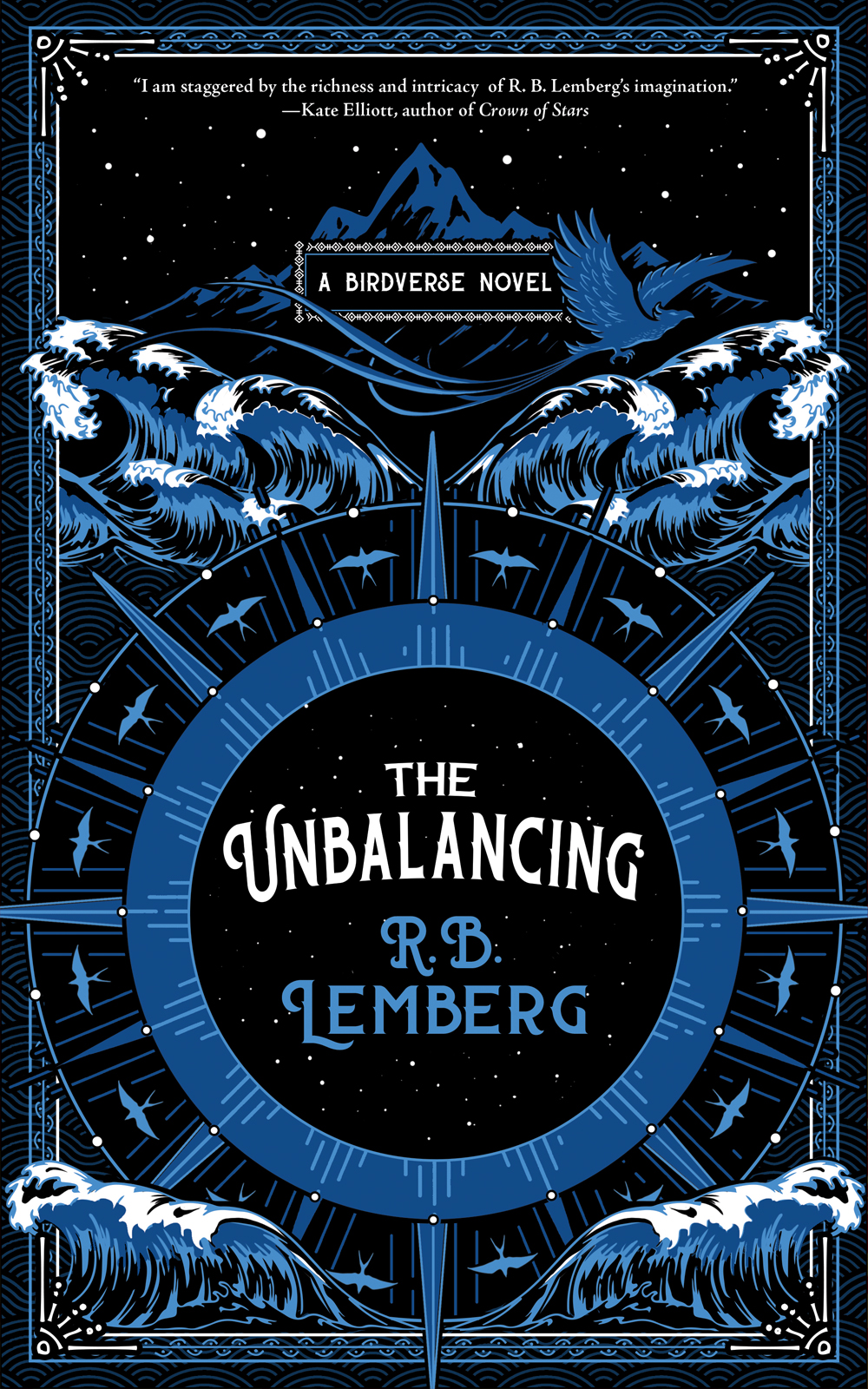
R. B. Lemberg is joining us today to talk about their novel, The Unbalancing. Here’s the publisher’s description:
In this first full-length novel from the acclaimed Birdverse, new love blossoms between an impatient starkeeper and a reclusive poet as they try together to save their island home. Nebula, Locus, and Ignyte finalist R. B. Lemberg (The Four Profound Weaves) has crafted a gorgeous tale of the inevitable transformations of communities and their worlds. The Unbalancing is rooted in the mystical cosmology, neurodiversity, and queerness that infuses Lemberg’s lyrical prose, which has invited glowing comparisons to N. K. Jemisin, Patricia A. McKillip, and Ursula K. LeGuin.
Beneath the waters by the islands of Gelle-Geu, a star sleeps restlessly. The celebrated new starkeeper Ranra Kekeri, who is preoccupied by the increasing tremors, confronts the problems left behind by her predecessor.
Meanwhile, the poet Erígra Lilún, who merely wants to be left alone, is repeatedly asked by their ancestor Semberi to take over the starkeeping helm. Semberi insists upon telling Lilun mysterious tales of the deliverance of the stars by the goddess Bird.
When Ranra and Lilun meet, sparks begin to fly. An unforeseen configuration of their magical deepnames illuminates the trouble under the tides. For Ranra and Lilun, their story is just beginning; for the people of Gelle-Geu, it may well be too late to save their home.
What’s R.B.’s favorite bit?

R.B. LEMBERG
My new Birdverse novel The Unbalancing is full of my favorite bits. I wrote this novel as an act of defiance and catharsis after a sudden passing of a close friend in 2020, and I clung for dear life to the many things that brought me joy – quince (my favorite fruit), queer communities, semi-obscure Jewish references, geeking out over magical geometry, multiple neurodivergent and a-spec characters. For My Favorite Bit, it was hard to choose what to talk about – is it poetry featuring doom and gloom? Is it listening to trees? Is it the Hebrew words hiding in plain sight? But I chose, in the end, to write about a person – my very best and grumpiest ancestral ghost, Semberí.
In Birdverse mythology, the goddess Bird brings twelve stars to the landmass as an act of creation. The stars fall from her tail into the waiting hands of the guardians, who carry them each to their land and plant them into the earth to serve as the foundations of the land and its magic. At the dawn of time, Semberí was one of the guardians, the first starkeepers. The star that Semberí caught was ailing and unresponsive, tossing and turning in an unquiet slumber. Semberí carried the star through many lands, but nobody wanted the two of them; when they finally found a home in the island Geu, Semberí was a ghost. They actually don’t remember that bit very well.
Semberí is… very lyrical, very elegant. Their ghostly form is made of tattered foam. They like to turn around dramatically, showing off the bits and pieces of foam in their sleeves. They are moody, and they yell an awful lot. Flouncing is a part of how they do conversations.
Semberí is aroace and nonbinary. They can be found haunting a hill overlooking the sea, a hill which long ago became a quince grove. The trees there are ancient, and nobody comes, mostly because Semberí has long mastered the trick of hiding the hill in a shrouding of fog. The islands are beautiful and prosperous, the communities living on an archipelago are welcoming and carefree, which is a problem for Semberí. Somebody needs to finally do something about the star’s unrest, but all the islanders care about is their parties.
In the very beginning of the novel they unhide the hill to admit one living poet, Erígra Lilún, who is a descendant of Semberí (they were an adoptive parent). Erígra is quiet and contemplative and could in principle be a pleasant companion, or so Semberí reckons. Things do not exactly go as planned.
Ghosts are a part of folklore of many cultures, including mine. I was a child in a room which was haunted, in Soviet-era L’viv. The ghost was someone I dreamt about a lot, and saw out of the corners of my eyes – later, just before the collapse of the Soviet Union and our migration, my mother took me to an archival photograph exhibit. There, on the balcony of our apartment, was the ghost as she was alive, in an enormous puffy dress. All that said, I don’t know if I believe in ghosts, but I do think about them an awful lot. Ghosts are about history, and memory, and the impression that pain can leave upon the land. There are other ghosts in Birdverse, some of them even directly connected to Semberí’s story, but I won’t spoiler it for you.
It was important for me to have multiple aromantic and asexual people in the story. The story centers a relationship between a queer, alloromantic and allosexual woman, and a demisexual nonbinary person. The word that the islanders have for a-spec people is “adar”, which is an imperfect word to express the full range of aromantic and asexual identities. It is something the characters struggle with. Erígra Lilún, the poet, is demisexual in our-world terms, and they feel that the word “adar” does not fit them. Semberí has invented the word and now just wants alloromantic and allosexual people to get off their lawn/hill/quince grove. Another aroace character in the book is Ulár, who is an absolute nerd about magic.
When I wrote the book, I wanted to imagine a queer utopia. People of all genders and sexualities are embraced in the archipelago, and there are many kinds of relationships and family structures. From the very beginning I loved this society, but struggled with it too – I knew that a-spec people would not fit as comfortably. It was important for me to explore this. Semberí is very sure that if people weren’t so focused on their parties, the ailing star could be healed.
It is not as simple. Few things are, certainly not in Birdverse. At the end of the book, Semberí too, finds an answer — which is about showing up to do the heavy lifting which one is able to do and which one must actively choose to do.
LINKS:
The Unbalancing Universal Book Link
BIO:
R. B. Lemberg is a queer, bigender immigrant from Eastern Europe and Israel. Their stories and poems have appeared in Lightspeed Magazine’s Queers Destroy Science Fiction!, Beneath Ceaseless Skies, Uncanny Magazine, Sisters of the Revolution: A Feminist Speculative Fiction Anthology, and many other venues. R.B.’s work has been a finalist for the Nebula, Crawford, and other awards. Their debut Birdverse novella, The Four Profound Weaves, came out from Tachyon in 2020; the novella was nominated for the World Fantasy, Locus, Nebula, and Ignyte awards, and it was selected for the Otherwise Award Honor List.
